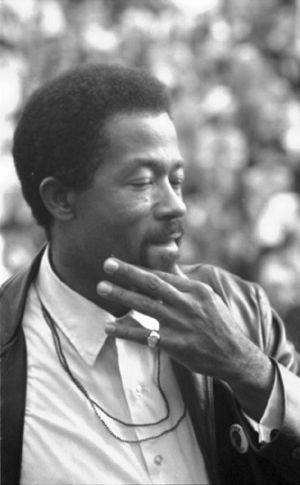Eldridge Cleaver
Eldridge Cleaver (August 31, 1935 – May 1, 1998) was an author, and a prominent American civil rights leader and activist, beginning as prominent member of the Black Panther Party.
Born in Wabbaseka, Arkansas, Cleaver's family moved to Phoenix and then to Los Angeles. As a teenager he became involved in petty crime, and in 1957 was convicted of assault with intent to murder. While in prison, he wrote a book of essays, Soul on Ice, which was influential in the black power movement and is now considered a classic by many people. In the book, Cleaver infamously acknowledges raping several white women, which he defended as "an insurrectionary act." He also admitted that he began his career as a rapist by "practicing on black girls in the ghetto." He maintains that his criminal actions have nothing to do with the views expressed in the book. Cleaver was released from prison in 1966, after which he joined the Oakland-based Black Panther Party and served as its Minister of Information (spokesperson).
He was a candidate for President in 1968 on the ticket of the Peace and Freedom Party. That same year, he was injured in a conflict between the Panthers and Oakland police. Charged with attempted murder, he jumped bail to flee to Algeria – where he was joined by Timothy Leary. Cleaver placed Leary under "revolutionary arrest" (kidnapped) as a counter-revolutionary, although Leary was later released. Cleaver later left Algeria, and spent time in both Cuba and France.
In 1975, Cleaver modeled anatomically fitted men's pants he designed featuring a "Cleaver sleeve" which was a penis sheath that was basically a sock protruding from the front of a pair of pants (see "Eldridge Cleaver Models his hot new pants" in Rolling Stone issue 197 dated October 9, 1975). The sleeve accommodated free movement and size changes of the enclosed male organ.
Soul on Fire
In his 1978 book Soul on Fire Cleaver revealed several surprising aspects of his exile in Algeria:
- Cleaver was supported by regular stipends from the Republic of North Vietnam, with which the USA was then at war.
- Cleaver was followed by other former-criminals-turned-revolutionaries, many of whom hijacked planes to get to Algeria. The Algerians expected Cleaver to keep his proteges in line, which he described as becoming increasingly difficult, as their increasing number stretched his North Vietnamese allowance to the breaking point. Cleaver organized a stolen car ring to employ his revolutionary proteges. They would steal cars in Europe, and sell them in Africa.
- Cleaver fled Algeria out of fear for his life. He could no longer control his proteges. Additionally, the Algerian police were cracking down on them. There had been gun battles. He abandoned his proteges and went to live underground in France.
- Cleaver experienced a Christian rebirth – became "born again" during his year of isolation, while living underground.
Return to America
Cleaver returned to the United States in 1975, and subsequently renounced the Black Panthers. Legal wrangling ended in his being sentenced to probation for assault.
In the early 1980s, Cleaver became interested in religion. He became disillusioned with the commercial nature of evangelical Christianity and decided to seek out truth. Cleaver searched everywhere from Sun Myung Moon's campus ministry organization CARP to Mormonism. Cleaver was baptized into The Church of Jesus Christ of Latter-day Saints and remained a member until his death in 1998.
By the 1980s, Cleaver had become a conservative Republican. He endorsed Ronald Reagan for President in 1980 and in 1986 he embarked on an unsuccessful GOP campaign to win one of California's seats in the United States Senate. (He failed to win his party's nomination.)
Later in the 1980s, Cleaver became addicted to crack cocaine. In 1992 he was convicted of cocaine possession and burglary. In 1994, after nearly dying in a cocaine-related assault, he kicked his addiction. [citation needed]
He became involved in fighting addictions with healthy nutrition.
Cleaver died of prostate cancer in Pomona, California in 1998 at the age of 62, and is interred in the Mountain View Cemetery, Altadena, California. He is survived by his daughter, Joju Younghi Cleaver, and son Macio Cleaver.
Quotes about Eldridge Cleaver
"I thought Eldridge was the reincarnation of Malcolm X. I'd never heard such power, such eloquence," David Hilliard
| Preceded by: 'None' |
Peace and Freedom Party Presidential candidate 1968 (lost) |
Succeeded by: Benjamin Spock |
ReferencesISBN links support NWE through referral fees
American punk band Dead To Me quotes Cleaver in the liner notes of their 2006 debut album "Cuban Ballerina."
American Rapper Ras Kass named his debut album after Cleaver's classic essay "Soul On Ice".
James "J.Y." Young mentions him during the track "Half Penny Two Penny" in the "Paradise Theatre" album. The song "Half Penny Two Penny" was an attack on the financial problems the US had in the late 1970s. In the song was the lyric; "Yes Mrs. Cleaver your son's home to stay" which was referring to Eldridge Cleaver (this was confirmed by James Young on In the Studio with Redbeard).
External links
- CNN Obituary
- PBS Frontline Interview with Eldridge Cleaver
- Reason Magazine Interview with Eldridge Cleaver
Credits
New World Encyclopedia writers and editors rewrote and completed the Wikipedia article in accordance with New World Encyclopedia standards. This article abides by terms of the Creative Commons CC-by-sa 3.0 License (CC-by-sa), which may be used and disseminated with proper attribution. Credit is due under the terms of this license that can reference both the New World Encyclopedia contributors and the selfless volunteer contributors of the Wikimedia Foundation. To cite this article click here for a list of acceptable citing formats.The history of earlier contributions by wikipedians is accessible to researchers here:
The history of this article since it was imported to New World Encyclopedia:
Note: Some restrictions may apply to use of individual images which are separately licensed.
